Early Christian Authorities Teach Theosis
Early Christian authorities teach that humanity should become God. This is the doctrine of theosis, also known as deification. Overt examples are below. More examples of the doctrine of theosis are in The Bible.
Saint Justin Martyr (100 to 165 CE)
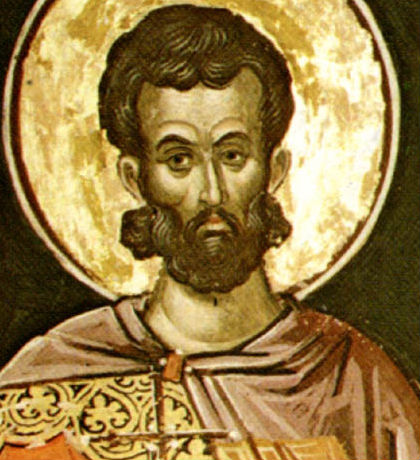
"And when I saw that they were perturbed because I said that we are the sons of God, I anticipated their questioning, and said, Listen, sirs, how the Holy Ghost speaks of this people, saying that they are all sons of the Highest; and how this very Christ will be present in their assembly, rendering judgment to all men. ... the Holy Ghost reproaches men because they were made like God, free from suffering and death, provided that they kept His commandments, and were deemed deserving of the name of His sons, ... all men are deemed worthy of becoming 'gods,' and of having power to become sons of the Highest; and shall be each by himself judged and condemned like Adam and Eve." (Justin Martyr. "Dialogue with Trypho 124." Ante-Nicene Fathers. Ed. Alexander Roberts. Vol. 1. New York: C. Scribner's Sons, 1905. 261-262. Print.)
Saint Theophilus of Antioch (to about 185 CE)
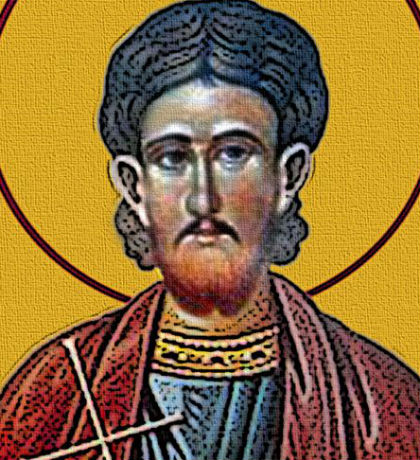
"Was man made by nature mortal? Certainly not. Was he, then, immortal? Neither do we affirm this. But one will say, Was he, then, nothing? Not even this hits the mark. He was by nature neither mortal nor immortal. For if He had made him immortal from the beginning, He would have made him God. Again, if He had made him mortal, God would seem to be the cause of his death. Neither, then, immortal nor yet mortal did He make him, but, as we have said above, capable of both; so that if he should incline to the things of immortality, keeping the commandment of God, he should receive as reward from Him immortality, and [man] should become God." (Theophilus of Antioch. "To Autolycus 2: 27." Ante-Nicene Fathers. Ed. Alexander Roberts. Vol. 2. New York: C. Scribner's Sons, 1905. 105. Print.)
Saint Irenaeus of Lyons (130 to 202 CE)
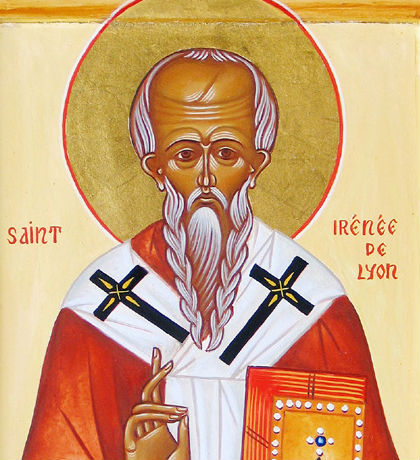
"... the Word says, mentioning His own gift of grace: 'I said, Ye are all the sons of the Highest, and gods; but ye shall die like men.' He speaks undoubtedly these words to those who have not received the gift of adoption, but who despise the incarnation of the pure generation of the Word of God, defraud human nature of promotion into God, and prove themselves ungrateful to the Word of God, who became flesh for them. For it was for this end that the Word of God was made man, and He who was the Son of God became the Son of man, that man, having been taken into the Word, and receiving the adoption, might become the son of God." (Irenaeus. "Against Heresies 3: 19: 1." Ante-Nicene Fathers. Ed. Alexander Roberts. Vol. 1. New York: C. Scribner's Sons, 1905. 448. Print.)
"Now it was necessary that man should in the first instance be created; and having been created, should receive growth; and having received growth, should be strengthened; and having been strengthened, should abound; and having abounded, should recover [from the disease of sin]; and having recovered, should be glorified; and being glorified, should see the Lord. For God is He who is yet to be seen, and the beholding of God is productive of immortality, but immortality renders one nigh unto God. ... because we have not been made gods from the beginning, but at first merely men, then at length gods; ..." (Irenaeus. "Against Heresies 4: 38: 3-4." Ante-Nicene Fathers. Ed. Alexander Roberts. Vol. 1. New York: C. Scribner's Sons, 1905. 522. Print.)
"... the Word of God, our Lord Jesus Christ, who did, through His transcendent love, become what we are, that He might bring us to be even what He is Himself." (Irenaeus. "Against Heresies 5: Preface." Ante-Nicene Fathers. Ed. Alexander Roberts. Vol. 1. New York: C. Scribner's Sons, 1905. 526. Print.)
Saint Clement of Alexandria (150 to 215 CE)
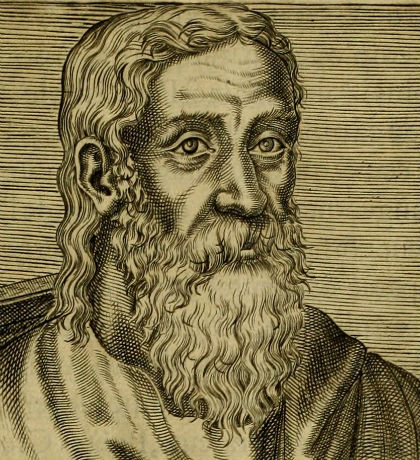
"Yea, I say, the Word of God became man, that thou mayest learn from man how man may become God." (Clement of Alexandria. "Exhortation to the Heathen 1." Ante-Nicene Fathers. Ed. Alexander Roberts. Vol. 2. New York: C. Scribner's Sons, 1905. 174. Print.)
"For 'the Sun of Righteousness,' ... pervades equally all humanity, ... having bestowed on us the truly great, divine, and inalienable inheritance of the Father, deifying man by heavenly teaching, putting His laws into our minds, and writing them on our hearts." (Clement of Alexandria. "Exhortation to the Heathen 11." Ante-Nicene Fathers. Ed. Alexander Roberts. Vol. 2. New York: C. Scribner's Sons, 1905. 203. Print.)
"But let us, O children of the good Father - nurslings of the good Instructor - fulfil the Father's will, listen to the Word, and take on the impress of the truly saving life of our Saviour; and meditating on the heavenly mode of life according to which we have been deified, let us anoint ourselves with the perennial immortal bloom of gladness - that ointment of sweet fragrance - having a clear example of immortality in the walk and conversation of the Lord; and following the footsteps of God, to whom alone it belongs to consider, and whose care it is to see to, the way and manner in which the life of men may be made more healthy." (Clement of Alexandria. "Instructor 1: 12." Ante-Nicene Fathers. Ed. Alexander Roberts. Vol. 2. New York: C. Scribner's Sons, 1905. 234. Print.)
"For if one knows himself, he will know God; and knowing God, he will be made like God, not by wearing gold or long robes, but by well-doing, and by requiring as few things as possible. Now, God alone is in need of nothing, and rejoices most when He sees us bright with the ornament of intelligence; ... [that man] has the form which is of the Word; he is made like to God; he is beautiful; he does not ornament himself: his is beauty, the true beauty, for it is God; and that man becomes God, since God so wills. Heraclitus, then, rightly said, 'Men are gods, and gods are men.' For the Word Himself is the manifest mystery: God in man, and man God." (Clement of Alexandria. "Instructor 3: 1." Ante-Nicene Fathers. Ed. Alexander Roberts. Vol. 2. New York: C. Scribner's Sons, 1905. 271. Print.)
"On this wise it is possible for the Gnostic already to have become God. 'I said, Ye are gods, and sons of the highest.' And Empedocles says that the souls of the wise become gods, writing as follows: 'At last prophets, minstrels, and physicians, And the foremost among mortal men, approach; Whence spring gods supreme in honours.'" (Clement of Alexandria. "Stromata 4: 24." Ante-Nicene Fathers. Ed. Alexander Roberts. Vol. 2. New York: C. Scribner's Sons, 1905. 437. Print.)
"By thus receiving the Lord's power, the soul studies to be God; regarding nothing bad but ignorance, and action contrary to right reason. ... And the perfect inheritance belongs to those who attain to 'a perfect man,' according to the image of the Lord. ... But 'it is enough for the disciple to become as the Master,' saith the Master. To the likeness of God, then, he that is introduced into adoption and the friendship of God, to the just inheritance of the lords and gods is brought; if he be perfected, according to the Gospel, as the Lord Himself taught." (Clement of Alexandria. "Stromata 6: 14." Ante-Nicene Fathers. Ed. Alexander Roberts. Vol. 2. New York: C. Scribner's Sons, 1905. 506. Print.)
"Knowledge then is followed by practical wisdom, and practical wisdom by self-control: for it may be said that practical wisdom is divine knowledge, and exists in those who are deified; but that self-control is mortal, and subsists in those who philosophize, and are not yet wise. But if virtue is divine, so is also the knowledge of it; while self-control is a sort of imperfect wisdom which aspires after wisdom, and exerts itself laboriously, and is not contemplative." (Clement of Alexandria. "Stromata 6: 15." Ante-Nicene Fathers. Ed. Alexander Roberts. Vol. 2. New York: C. Scribner's Sons, 1905. 509. Print.)
"It leads us to the endless and perfect end, teaching us beforehand the future life that we shall lead, according to God, and with gods; after we are freed from all punishment and penalty which we undergo, in consequence of our sins, for salutary discipline. After which redemption and reward and the honours are assigned to those who have become perfect; ... Then become pure in heart, and near to the Lord, there awaits them restoration to everlasting contemplation; and they are called by the appellation of gods, being destined to sit on thrones with the other gods that have been first put in their places by the Saviour." (Clement of Alexandria. "Stromata 7: 10." Ante-Nicene Fathers. Ed. Alexander Roberts. Vol. 2. New York: C. Scribner's Sons, 1905. 539. Print.)
"What, then, shall we say of the Gnostic himself? 'Know ye not,' says the Apostle, 'that ye are the temple of God?' The Gnostic is consequently divine, and already holy, God-bearing, and God-borne." (Clement of Alexandria. "Stromata 7: 13." Ante-Nicene Fathers. Ed. Alexander Roberts. Vol. 2. New York: C. Scribner's Sons, 1905. 547. Print.)
"... on hearing the scriptures, and turned his life to the truth, [He] is, as it were, from being a man made a god. ... And as, if one devote himself to Ischomachus, he will make him a farmer; ... and to Aristotle, a naturalist; and to Plato, a philosopher: so he who listens to the Lord, and follows the prophecy given by Him, will be formed perfectly in the likeness of the teacher -- [he will be] made a god going about in flesh." (Clement of Alexandria. "Stromata 7: 16." Ante-Nicene Fathers. Ed. Alexander Roberts. Vol. 2. New York: C. Scribner's Sons, 1905. 551, 553. Print.)
Tertullian of Carthage (160 to 220 CE)

"Now, although Adam was by reason of his condition under law subject to death, yet was hope preserved to him by the Lord's saying, 'Behold, Adam is become as one of us;' that is, in consequence of the future taking of the man into the divine nature." (Tertullian. "Against Marcion 2: 25." Ante-Nicene Fathers. Ed. Alexander Roberts. Vol. 3. New York: C. Scribner's Sons, 1905. 317. Print.)
"Well, then, you say, we ourselves at that rate posses nothing of God. But indeed we do, and shall continue to do - only it is from Him that we receive it, and not from ourselves. For we shall be even gods, if we shall deserve to be ...'" (Tertullian. "Against Hermogenes 5." Ante-Nicene Fathers. Ed. Alexander Roberts. Vol. 3. New York: C. Scribner's Sons, 1905. 479. Print.)
Saint Hippolytus of Rome (170 to 236 CE)
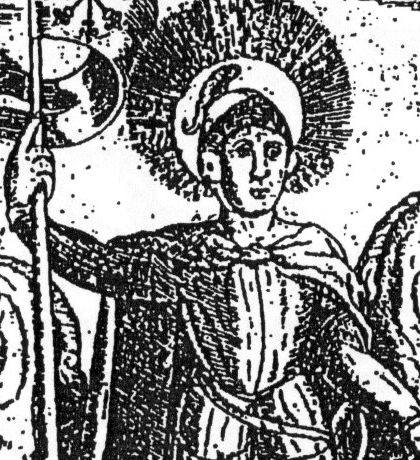
"For if He had willed to make thee a god, He could have done so. Thou hast the example of the Logos. His will, however, was, that you should be a man, and He has made thee a man. But if thou art desirous of also becoming a god, obey Him that has created thee, and resist not now, in order that, being found faithful in that which is small, you may be enabled to have entrusted to you also that which is great. ... thou, when thou art in tribulation, mayest not be disheartened, but, confessing thyself to be a man (of like nature with the Redeemer), mayest dwell in expectation of also receiving what the Father has granted unto this Son." (Hippolytus of Rome. "Refutation of All Heresies 10: 29." Ante-Nicene Fathers. Ed. Alexander Roberts. Vol. 5. Buffalo: Christian Literature, 1886. 151-152. Print.)
"And thou shalt be a companion of the Deity, and a co-heir with Christ, no longer enslaved by lusts or passions, and never again wasted by disease. For thou hast become God: ... whatever it is consistent with God to impart, these God has promised to bestow upon thee, because thou hast been deified, and begotten unto immortality. This constitutes the import of the proverb, 'Know thyself;' i.e., discover God within thyself, ... thou shalt have honour conferred upon thee by Him. For the Deity, (by condescension,) does not diminish aught of the dignity of His divine perfection; having made thee even God unto His glory!" (Hippolytus of Rome. "Refutation of All Heresies 10: 30." Ante-Nicene Fathers. Ed. Alexander Roberts. Vol. 5. Buffalo: Christian Literature, 1886. 153. Print.)
"If, therefore, man has become immortal, [man] will also be God. And if [man] is made God by water and the Holy Spirit after the regeneration of the laver he is found to be also joint-heir with Christ after the resurrection from the dead." (Hippolytus of Rome. "Discourse on the Holy Theophany 8." Ante-Nicene Fathers. Ed. Alexander Roberts. Vol. 5. Buffalo: Christian Literature, 1886. 237. Print.)
Origen Adamantius (182 to 254 CE)
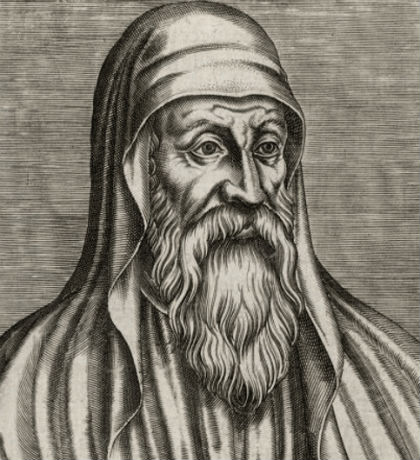
"... they saw also that the power which had descended into human nature, and into the midst of human miseries, and which had assumed a human soul and body, contributed through faith, along with its divine elements, to the salvation of believers, when they see that from Him there began the union of the divine with the human nature, in order that the human, by communion with the divine, might rise to be divine, not in Jesus alone, but in all those who not only believe, but enter upon the life which Jesus taught, and which elevates to friendship with God and communion with Him every one who lives according to the precepts of Jesus." (Origen. "Against Celsus 3: 28." Ante-Nicene Fathers. Ed. Alexander Roberts. Vol. 4. Buffalo: Christine Literature, 1885. 475. Print.)
"... take note of those who teach the Gospel of Jesus in all lands in soundness of doctrine and uprightness of life, and who are themselves termed 'christs' by the holy Scriptures, ... knowing that Christ has come, we see that, owing to Him, there are many christs in the world, ... therefore God, the God of Christ, anointed them also with the 'oil of gladness.' ... Therefore, since Christ is the Head of the Church, so that Christ and the Church form one body, the ointment descended from the head to the beard of Aaron, - the symbols of the perfect man, - and this ointment in its descent reached to the very skirt of his garment." (Origen. "Against Celsus 6: 79." Ante-Nicene Fathers. Ed. Alexander Roberts. Vol. 4. Buffalo: Christine Literature, 1885. 609. Print.)
"And thus the first-born of all creation, who is the first to be with God, and to attract to Himself divinity, is a being of more exalted rank than the other gods beside Him, of whom God is the God, ... It was by the offices of the first-born that they became gods, for He drew from God in generous measure that they should be made gods, and He communicated it to them according to His own bounty. The true God, then, is 'The God,' and those who are formed after Him are gods, images, as it were, of Him the prototype. But the archetypal image, again, of all these images is the Word of God, who was in the beginning ..." (Origen. "Commentary on John 2: 2." Ante-Nicene Fathers. Ed. Alexander Roberts. Vol. 9. New York: S. Scribner's Sons, 1899. 323. Print.)
"Now the God of the universe is the God of the elect, and in a much greater degree of the Saviours of the elect: then He is the God of these beings who are truly Gods, ... There was God with the article and God without the article, then there were gods in two orders, at the summit of the higher order of whom is God the Word, transcended Himself by the God of the universe. And, again, there was the Logos with the article and the Logos without the article, corresponding to God absolutely and a god; and the Logoi in two ranks. And some men are connected with the Father, being part of Him, and next ... those who have come to the Saviour ..." (Origen. "Commentary on John 2: 3." Ante-Nicene Fathers. Ed. Alexander Roberts. Vol. 9. New York: S. Scribner's Sons, 1899. 324. Print.)
"Consider if the other things which Christ is said to be in a unity admit of being multiplied in the same way and spoken of in the plural. For example, Christ is our life as the Saviour Himself says, 'I am the way and the truth and the life.' ... for it is on account of Christ who is life in every one that there are many lives. This, perhaps, is also the key to the passage, 'If ye seek a proof of the Christ that speaketh in me.' For Christ is found in every saint, and so from the one Christ there come to be many Christs, imitators of Him and formed after Him who is the image of God; whence God says through the prophet, 'Touch not my Christs.'" (Origen. "Commentary on John 6: 3." Ante-Nicene Fathers. Ed. Alexander Roberts. Vol. 9. New York: S. Scribner's Sons, 1899. 353. Print.)
"Now, we have presented these comments that we may flee being men with all our strength, and hasten to become 'gods,' since, indeed, insofar as we are men, we are liars, just as also the father of the lie is a liar." (Origen. "Commentary on John 20: 266." Commentary on the Gospel According to John, Books 13-32. Trans. Ronald E. Heine. Washington, D.C.: Catholic University of America, 1993. 261. Print.)
"... ascended above all material things, that it may scrupulously contemplate God, [the mind] is made divine by what it contemplates. We must say that this is what is meant when it is said that the face of the one who contemplated God, conversed with him, and spent time with such a vision, was glorified. Consequently, the figurative meaning of the glorification of Moses' face is that his mind was made godlike. It is in this same sense that the Apostle said, 'But we all, beholding the glory of the Lord with unveiled face are transformed into the same image.'" (Origen. "Commentary on John 32: 338-340." Commentary on the Gospel According to John, Books 13-32. Trans. Ronald E. Heine. Washington, D.C.: Catholic University of America, 1993. 406. Print.)
Saint Cyprian of Carthage (about 200 to 258 CE)
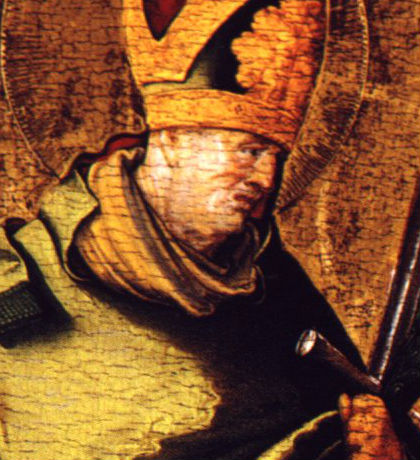
"... [The Son of God] was announced as the enlightener and teacher of the human race. He is the power of God, He is the reason, He is His wisdom and glory; He enters into a virgin; being the holy Spirit, He is endued with flesh; God is mingled with man. This is our God, this is Christ, who, as the mediator of the two, puts on man that He may lead them to the Father. What man is, Christ was willing to be, that man also may be what Christ is. ... Therefore we accompany Him, we follow Him, we have Him as the Guide of our way, the Source of light, the Author of salvation, promising as well the Father as heaven to those who seek and believe. What Christ is, we Christians shall be, if we imitate Christ." (Cyprian of Carthage. "Treatise 6: 11, 15." Ante-Nicene Fathers. Ed. Alexander Roberts. Vol. 5. Buffalo: Christian Literature, 1886. 468-469. Print.)
Saint Gregory Thaumaturgus the Wonderworker of Neocaesarea (213 to 270 CE)
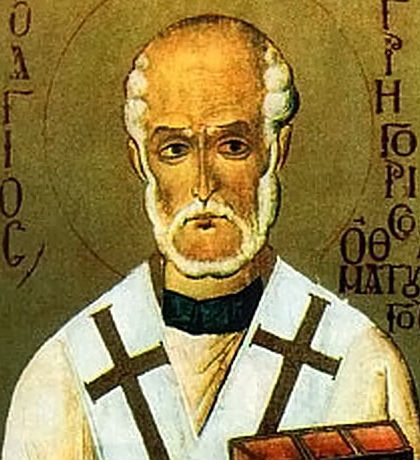
"And he educated us ... to desire and endeavour to know ourselves, which indeed is the most excellent achievement of philosophy, the thing that is ascribed also to the most prophetic of spirits as the highest argument of wisdom - ... that such is the heavenly prudence, is affirmed well by the ancients; for in this there is one virtue common to God and to man; while the soul is exercised in beholding itself as in a mirror, and reflects the divine mind in itself, if it is worthy of such a relation, and [the soul] traces out a certain inexpressible method for the attaining of a kind of apotheosis." (Gregory of Neocaesarea. "Oration and Panegyric Addressed to Origen 11." Ante-Nicene Fathers. Ed. Alexander Roberts. Vol. 6. New York: Christian Literature, 1896. 33. Print.)
"For we hold that the Word of God was made man on account of our salvation, in order that we might receive the likeness of the heavenly, and be made divine after the likeness of Him who is the true Son of God by nature, and the Son of man according to the flesh, our Lord Jesus Christ." (Gregory of Neocaesarea. "Sectional Confession of Faith 16." Ante-Nicene Fathers. Ed. Alexander Roberts. Vol. 6. New York: Christian Literature, 1896. 45. Print.)
Saint Methodius of Olympus (to 311 CE)
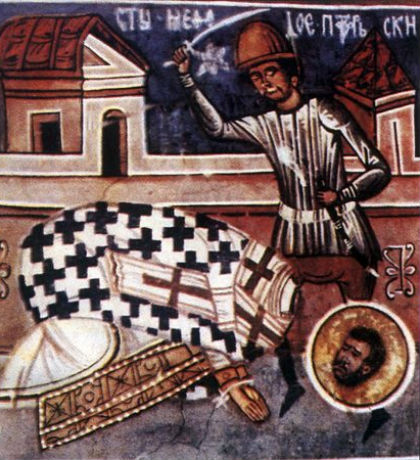
"... since the enlightened receive the features, and the image, and the manliness of Christ, the likeness of the form of the Word being stamped upon them, and begotten in them by a true knowledge and faith, so that in each one Christ is spiritually born. And, therefore, the Church swells and travails in birth until Christ is formed in us, so that each of the saints, by partaking of Christ, has been born a Christ. According to which meaning it is said in a certain scripture, 'Touch not mine anointed, and do my prophets no harm,' as though those who were baptized into Christ had been made Christs by communication of the Spirit, ..." (Methodius of Olympus. "Banquet of the Ten Virgins 8: 8." Ante-Nicene Fathers. Ed. Alexander Roberts. Vol. 6. New York: Christian Literature, 1896. 337. Print.)
Saint Anthony the Great of Thebes (251 to 356 CE)
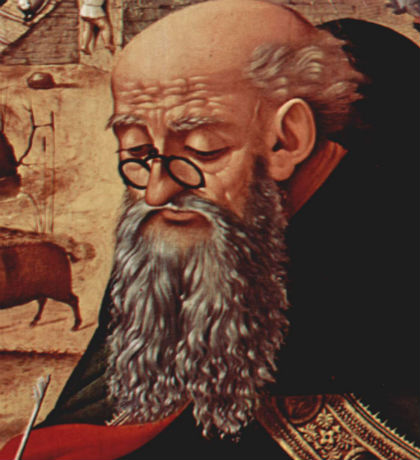
"Those who pursue a life of holiness, enjoying the love of God, cultivate the virtues of the soul, ... knowledge of God, self-control, goodness, beneficence, devoutness and gentleness deify the soul." (Antony the Great. "On the Character of Men and on the Virtuous Life 34." Philokalia. Ed. G.E.H. Palmer. Vol. 1. London: Faber and Faber, 1981. 334. Print.)
"A true man is one who understand that the body is corruptible and short-lived, whereas the soul is divine and immortal and, while being God's breath, is joined to the body to be tested and deified." (Antony the Great. "On the Character of Men and on the Virtuous Life 124." Philokalia. Ed. G.E.H. Palmer. Vol. 1. London: Faber and Faber, 1981. 348. Print.)
"God loves man and, wherever man may be, God too is there. ... For man's sake God has created everything: earth and heaven and the beauty of the stars. Men cultivate the earth for themselves, but if they fail to recognize how great is God's providence, their souls lack all spiritual understanding. ... The man who possesses intellect always chooses what is best. ... The intellect manifests itself in the soul, ... The soul is divinized through the intellect, ..." (Antony the Great. "On the Character of Men and on the Virtuous Life 132-135." Philokalia. Ed. G.E.H. Palmer. Vol. 1. London: Faber and Faber, 1981. 349. Print.)
"So he is never able to look up, and to see and know God, who has created all things that man may be saved and deified." (Antony the Great. "On the Character of Men and on the Virtuous Life 168." Philokalia. Ed. G.E.H. Palmer. Vol. 1. London: Faber and Faber, 1981. 355. Print.)
Saint Athanasius the Great of Alexandria (296 to 373 CE)
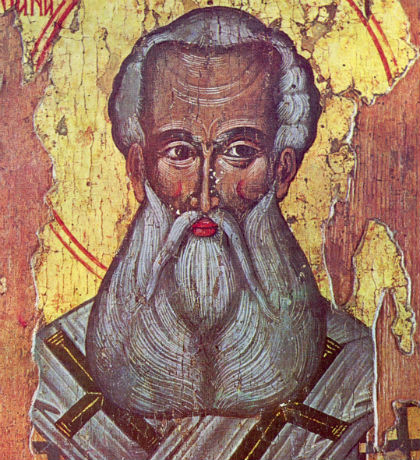
"For He was made man that we might be made God; and He manifested Himself by a body that we might receive the idea of the unseen Father: ..." (Athanasius of Alexandria. "Incarnation of the Word 54." Nicene and Post-Nicene Fathers. Ed. Philip Schaff. Vol. 4. New York: Christian Literature, 1892. 65. Print. Ser. 2.)
"... the Word was made flesh in order to offer up this body for all, and that we, partaking of His Spirit, might be deified, ... for hence we derive our name of 'men of God' and 'men in Christ.'" (Athanasius of Alexandria. "Defence of the Nicene Definition 14." Nicene and Post-Nicene Fathers. Ed. Philip Schaff. Vol. 4. New York: Christian Literature, 1892. 159. Print. Ser. 2.)
"... He Himself has made us sons of the Father, and deified men by becoming Himself man. Therefore He was not man, and then became God, but He was God, and then became man, and that to deify us. ... And if all that are called sons and gods, whether in earth or in heaven, were adopted and deified through the Word, and the Son Himself is the Word, it is plain that through Him are they all, ..." (Athanasius of Alexandria. "Against the Arians 1: 38-39." Nicene and Post-Nicene Fathers. Ed. Philip Schaff. Vol. 4. New York: Christian Literature, 1892. 329. Print. Ser. 2.)
"... we must not conceive that the whole Word is in nature a creature, but that He put on the created body and that God created Him for our sakes, preparing for Him the created body, as it is written, for us, that in Him we might be capable of being renewed and deified." (Athanasius of Alexandria. "Against the Arians 2: 47." Nicene and Post-Nicene Fathers. Ed. Philip Schaff. Vol. 4. New York: Christian Literature, 1892. 374. Print. Ser. 2.)
"For therefore did He assume the body originate and human, that having renewed it as its Framer, He might deify it in Himself, and thus might introduce us all into the kingdom of heaven after His likeness. ... For therefore the union was of this kind, that He might unite what is man by nature to Him who is in the nature of the Godhead, and [man's] salvation and deification might be sure." (Athanasius of Alexandria. "Against the Arians 2: 70." Nicene and Post-Nicene Fathers. Ed. Philip Schaff. Vol. 4. New York: Christian Literature, 1892. 386. Print. Ser. 2.)
"For as, although there be one Son by nature, True and Only-begotten, we too become sons, not as He in nature and truth, but according to the grace of Him that calleth, and though we are men from the earth, are yet called gods, ..." (Athanasius of Alexandria. "Against the Arians 3: 19." Nicene and Post-Nicene Fathers. Ed. Philip Schaff. Vol. 4. New York: Christian Literature, 1892. 404. Print. Ser. 2.)
"For what the Word has by nature, as I said, in the Father, that He wishes to be given to us through the Spirit irrevocably; ... It is the Spirit then which is in God, and not we viewed in our own selves; and as we are sons and gods because of the Word in us, so we shall be in the Son and in the Father, and we shall be accounted to have become one in Son and in Father, because that that Spirit is in us, which is in the Word which is in the Father." (Athanasius of Alexandria. "Against the Arians 3: 25." Nicene and Post-Nicene Fathers. Ed. Philip Schaff. Vol. 4. New York: Christian Literature, 1892. 407. Print. Ser. 2.)
"... for as the Lord, putting on the body, became man, so we men are deified by the Word as being taken to Him through His flesh, and henceforward inherit life everlasting." (Athanasius of Alexandria. "Against the Arians 3: 34." Nicene and Post-Nicene Fathers. Ed. Philip Schaff. Vol. 4. New York: Christian Literature, 1892. 413. Print. Ser. 2.)
"But if that He might redeem mankind, the Word did come among us; and that He might hallow and deify them, the Word became flesh ..." (Athanasius of Alexandria. "Against the Arians 3: 39." Nicene and Post-Nicene Fathers. Ed. Philip Schaff. Vol. 4. New York: Christian Literature, 1892. 415. Print. Ser. 2.)
"... What moreover is this advance that is spoken of, but, as I said before, the deifying and grace imparted from Wisdom to men, ... according to their likeness and relationship to the flesh of the Word? ... in Him was the flesh which advanced and His is it called, and that as before, that man's advance might abide and fail not, because of the Word which is with it. ... the flesh became the body of Wisdom. ... the manhood advaced in Wisdom, transcending by degrees human nature, and being deified, and becoming and appearing to all as the organ of Wisdom for the operation and the shining forth of the Godhead." (Athanasius of Alexandria. "Against the Arians 3: 53." Nicene and Post-Nicene Fathers. Ed. Philip Schaff. Vol. 4. New York: Christian Literature, 1892. 422. Print. Ser. 2.)
"... while all things originated have by participation the grace of God, He is the Father's Wisdom and Word of which all things partake, it follows that He, being the deifying and enlightening power of the Father, in which all things are deified and quickened, is not alien in essence from the Father, but coessential. For by partaking of Him, we partake of the Father; because that the Word is the Father's own." (Athanasius of Alexandria. "Councils of Ariminum and Seleucia 51." Nicene and Post-Nicene Fathers. Ed. Philip Schaff. Vol. 4. New York: Christian Literature, 1892. 477. Print. Ser. 2.)
"For He has become Man, that He might deify us in Himself, and He has been born of a woman, and begotten of a Virgin, in order to transfer to Himself our erring generation, and that we may become henceforth a holy race, and 'partakers of the Divine Nature,' as blessed Peter wrote." (Athanasius of Alexandria. "Letter to Adelphium 4." Nicene and Post-Nicene Fathers. Ed. Philip Schaff. Vol. 4. New York: Christian Literature, 1892. 576. Print. Ser. 2.)
"And we are deified not by partaking of the body of some man, but by receiving the Body of the Word Himself." (Athanasius of Alexandria. "Letter to Maximus 2." Nicene and Post-Nicene Fathers. Ed. Philip Schaff. Vol. 4. New York: Christian Literature, 1892. 578-579. Print. Ser. 2.)
Saint Hilary of Poitiers (300 to 368 CE)
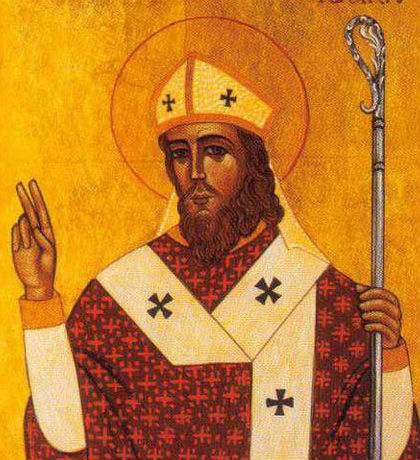
"But the Incarnation is summed up in this, that the whole Son, that is, His manhood as well as His divinity, was permitted by the Father's gracious favour to continue in the unity of the Father's nature, and retained not only the powers of the divine nature, but also that nature's self. For the object to be gained was that man might become God. But the assumed manhood could not in any wise abide in the unity of God, unless, through unity with God, it attained to unity with the nature of God. ... the assumed flesh had obtained the glory of the Word. Therefore the Father must reinstate the Word in His unity, that the offspring of His nature might again return to be glorified in Himself: ..." (Hilary of Poitiers. "On the Trinity 9: 38." Nicene and Post-Nicene Fathers. Ed. Philip Schaff. Vol. 9. New York: C. Scribner's Sons, 1899. 167. Print. Ser. 2.)
Saint Cyril of Jerusalem (313 to 386 CE)
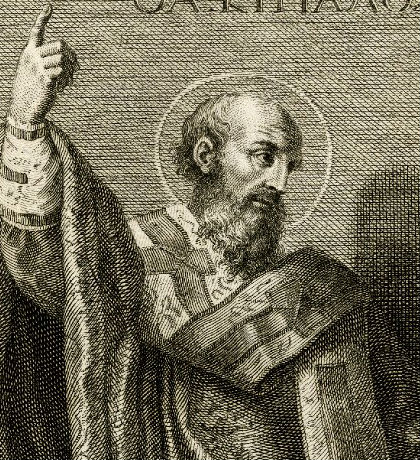
"Having been baptized into Christ, and put on Christ, ye have been made conformable to the Son of God; for God having foreordained us unto adoption as sons, made us to be conformed to the body of Christ's glory. Having therefore become partakers of Christ, ye are properly called Christs, and of you God said, Touch not My Christs, or anointed. Now ye have been made Christs, by receiving the antitype of the Holy Ghost; and all things have been wrought in you by imitation, because ye are images of Christ. ... after you had come up from the pool of the sacred streams, there was given an Unction, the anti-type of that wherewith Christ was anointed; ..." (Cyril of Jerusalem. "Catechetical Lecture 21: 1." Nicene and Post-Nicene Fathers. Ed. Philip Schaff. Vol. 7. New York: Christian Literature, 1894. 149. Print. Ser. 2.)
Saint Basil the Great of Caesarea (330 to 379 CE)
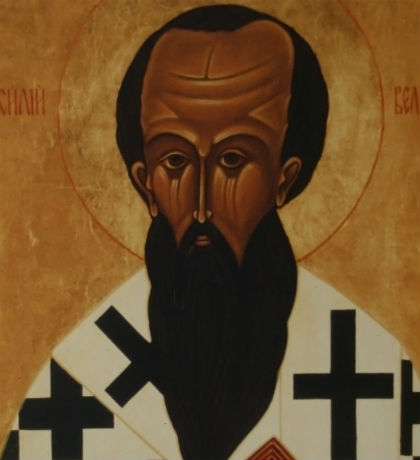
"Shining upon those that are cleansed from every spot, He makes them spiritual by fellowship with Himself. Just as when a sunbeam falls on bright and transparent bodies, they themselves become brilliant too, and shed forth a fresh brightness from themselves, so souls wherein the Spirit dwells, illuminated by the Spirit, themselves become spiritual, and send forth their grace to others. Hence comes foreknowledge of the future, understanding of mysteries, apprehension of what is hidden, distribution of good gifts, the heavenly citizenship, a place in the chorus of angels, joy without end, abiding in God, the being made like to God, and, highest of all, the being made God." (Basil of Caesarea. "On the Spirit 23." Nicene and Post-Nicene Fathers. Ed. Philip Schaff. Vol. 8. New York: Christian Literature, 1895. 15-16. Print. Ser. 2.)
Saint Gregory the Theologian of Nazianzus (330 to 390 CE)
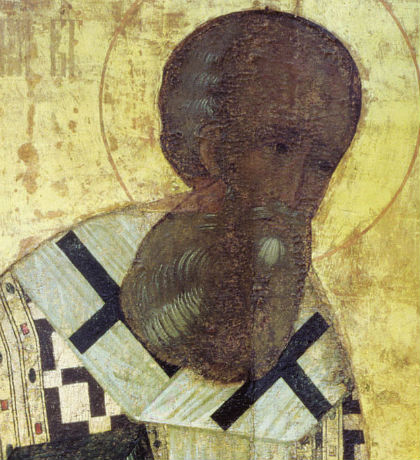
"But the scope of our art is to provide the soul with wings, to rescue it from the world and give it to God, and to watch over that which is in His image, if it abides, to take it by the hand, if it is in danger, or restore it, if ruined, to make Christ to dwell in the heart by the Spirit: and, in short, to deify, and bestow heavenly bliss upon, one who belongs to the heavenly host. This is the wish of our schoolmaster the law, of the prophets who intervened between Christ and the law, of Christ who is the fulfiller and end of the spiritual law; ... of the novel union between God and man, one consisting of two, and both in one." (Gregory of Nazianzus. "Oration 2: 22-23." Nicene and Post-Nicene Fathers. Ed. Philip Schaff. Vol. 7. New York: Christian Literature, 1894. 209-210. Print. Ser. 2.)
"Who can mould, as clay-figures are modelled in a single day, the defender of the truth, who is to take his stand with Angels, and give glory with Archangels, and cause the sacrifice to ascend to the altar on high, and share the priesthood of Christ, and renew the creature, and set forth the image, and create inhabitants for the world above, aye and, greatest of all, be God, and make others to be God? I know Whose ministers we are, and where we are placed, and whither we are guides." (Gregory of Nazianzus. "Oration 2: 73-74." Nicene and Post-Nicene Fathers. Ed. Philip Schaff. Vol. 7. New York: Christian Literature, 1894. 220. Print. Ser. 2.)
"Whoever has been permitted ... to hold communion with God, and be associated, as far as man's nature can attain, with the purest Light, blessed is he, both from his ascent from hence, and for his deification there, ..." (Gregory of Nazianzus. "Oration 21: 2." Nicene and Post-Nicene Fathers. Ed. Philip Schaff. Vol. 7. New York: Christian Literature, 1894. 270. Print. Ser. 2.)
"While His inferior Nature, the Humanity, became God, because it was united to God, and become One Person because the Higher Nature prevailed ... in order that I too might be made God so far as He is made Man. " (Gregory of Nazianzus. "Oration 29: 19." Nicene and Post-Nicene Fathers. Ed. Philip Schaff. Vol. 7. New York: Christian Literature, 1894. 308. Print. Ser. 2.)
"What greater destiny can befall man's humility than that he should be intermingled with God, and by this intermingling should be deified, and that we should be so visited by the Dayspring from on high, that even that Holy Thing that should be born should be called the Son of the Highest, and that there should be bestowed upon Him a Name which is above every name? And what else can this be than God?" (Gregory of Nazianzus. "Oration 30: 3." Nicene and Post-Nicene Fathers. Ed. Philip Schaff. Vol. 7. New York: Christian Literature, 1894. 310. Print. Ser. 2.)
"For if He is not to be worshipped, how can He deify me by Baptism?" (Gregory of Nazianzus. "Oration 31: 28." Nicene and Post-Nicene Fathers. Ed. Philip Schaff. Vol. 7. New York: Christian Literature, 1894. 327. Print. Ser. 2.)
"I dare to utter something, O Trinity; and may pardon be granted to my folly, for the risk is to my soul. I too am an Image of God, of the Heavenly Glory, though I be placed on earth. I cannot believe that I am saved by one who is my equal. If the Holy Ghost is not God, let Him first be made God, and then let Him deify me His equal." (Gregory of Nazianzus. "Oration 34: 12." Nicene and Post-Nicene Fathers. Ed. Philip Schaff. Vol. 7. New York: Christian Literature, 1894. 337. Print. Ser. 2.)
"A living creature trained here, and then moved elsewhere; and, to complete the mystery, deified by its inclination to God. For to this, I think, tends that Light of Truth which we here possess but in measure, that we should both see and experience the Splendour of God, which is worthy of Him Who made us, and will remake us again after a loftier fashion." (Gregory of Nazianzus. "Oration 38: 11." Nicene and Post-Nicene Fathers. Ed. Philip Schaff. Vol. 7. New York: Christian Literature, 1894. 348. Print. Ser. 2.)
"And how is He not God, if I may digress a little, by whom you too are made God?" (Gregory of Nazianzus. "Oration 39: 17." Nicene and Post-Nicene Fathers. Ed. Philip Schaff. Vol. 7. New York: Christian Literature, 1894. 358. Print. Ser. 2.)
"Believe that the Son of God, the Eternal Word, Who was begotten of the Father before all time and without body, was in these latter days for your sake made also Son of Man, born of the Virgin Mary ineffably and stainlessly (for nothing can be stained where God is, and by which salvation comes), in His own Person at once entire Man and perfect God, for the sake of the entire sufferer, that He may bestow salvation on your whole being, having destroyed the whole condemnation of your sins: impassible in His Godhead, passible in that which He assumed; as much Man for your sake as you are made God for His." (Gregory of Nazianzus. "Oration 40: 45." Nicene and Post-Nicene Fathers. Ed. Philip Schaff. Vol. 7. New York: Christian Literature, 1894. 377. Print. Ser. 2.)
Saint Marcus Eremita the Ascetic (to before 451 CE)

"All the penalties imposed by divine judgment upon man for the sin of the first transgression - death, toil, hunger, thirst and the like - He took upon Himself, becoming what we are, so that we might become what He is. The Logos became man, so that man might become Logos. Being rich, He became poor for our sakes, so that through His poverty we might become rich. In His great love for man He became like us, so that through every virtue we might become like Him. From the time that Christ came to dwell with us, man created according to God's image and likeness is truly renewed through the grace and power of the Spirit, attaining to the perfect love which 'casts out fear' - the love which is no longer able to fail, for 'love never fails'." (Mark the Ascetic. "To Nicolas the Solitary." Philokalia. Ed. G.E.H. Palmer. Vol. 1. London: Faber and Faber, 1981. 155. Print.)
Theodoret of Cyrus (393 to 457 CE)
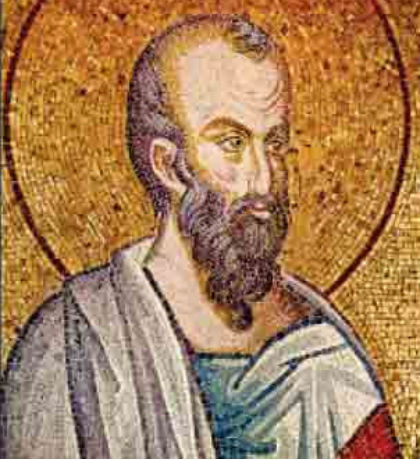
"If then, because the name of the Christ is common, we ought not to glorify the Christ as God, we shall equally shrink from worshipping Him as Son, since this also is a name which has been bestowed upon many. And why do I say the Son? The very name of God itself has been given by God to many. ... Let us not then, because others are called christs, rob ourselves of the worship of our Lord Jesus Christ. For just as though many are called gods and fathers, there is one God and Father over all and before the ages; and though many are called sons, there is one real and natural Son; ... just so though many are called christs there is one Lord Jesus Christ by Whom are all things." (Theodoret of Cyrus. "Letter 146." Nicene and Post-Nicene Fathers. Ed. Philip Schaff. Vol. 3. New York: Christian Literature, 1892. 319. Print. Ser. 2.)
Saint Diadochos of Photiki (about 400 to before 486 CE)
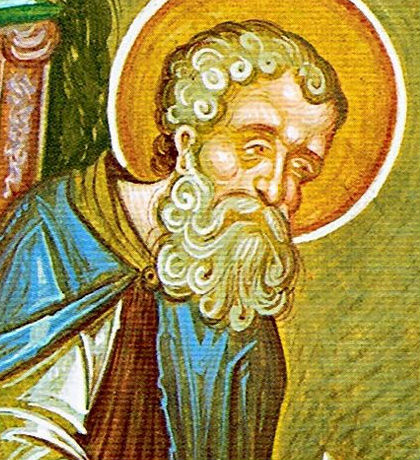
"Divine grace confers on us two gifts ... The first gift is given to us at once, ... the image of God ... The second - our likeness to God - requires our co-operation. When the intellect begins to perceive the Holy Spirit with full conciousness, we should realize that grace is beginning to paint the divine likeness over the divine image in us. ... Our power of perception shows us that we are being formed into the divine likeness, but the perfecting of this likeness we shall know only by the light of grace. ... Only when [the intellect] has been made like God ... does it bear the likeness of divine love as well. ... then it is evident that the image has been fully transformed into the beauty of the likeness." (Diadochos of Photiki. "On Spiritual Knowledge and Discrimination 89." Philokalia. Ed. G.E.H. Palmer. Vol. 1. London: Faber and Faber, 1981. 288. Print.)
Saint Thalassios the Libyan (before 580 to after 640 CE)
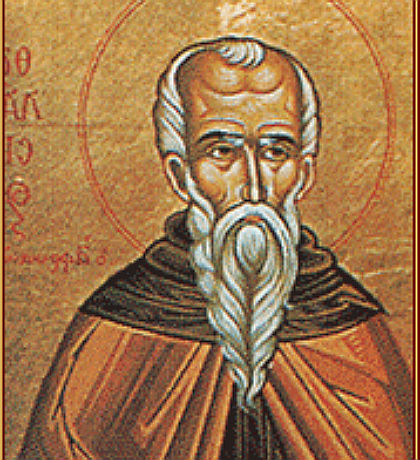
"God, who gave being to all that is, at the same time united all things together in His providence. Being Master, He became servant, and so revealed to the world the depths of His providence. God the Logos, in becoming incarnate while remaining unchanged, was united through His flesh with the whole of creation. There is a new wonder in heaven and on earth: God is on earth, and man is in heaven. He united men and angels so as to bestow deification on all creation. The knowledge of the holy and coessential Trinity is the sanctification and deification of men and angels. Forgiveness of sins is betokened by freedom from the passions; ..." (Thalassius the Libyan. "On Love, Self Control and Life in accordance with the Intellect 1: 95-101." Philokalia. Ed. G.E.H. Palmer. Vol. 2. London: Faber and Faber, 1981. 312. Print.)
Saint Maximus the Confessor of Constantinople (580 to 662 CE)
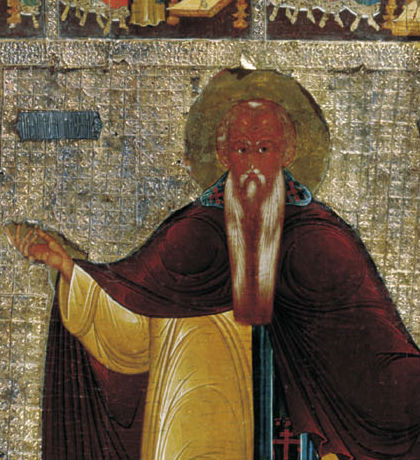
"But when he has crossed the Jordan he passes over into the land of spiritual knowledge, where the intellect, the temple mystically built by peace, becomes in spirit the dwelling place of God. ... He experiences the blessed life of God, who is the only true life, and himself becomes god by deification. The sixth day is the complete fulfillment, ... of the natural activities which lead to virtue. The seventh day is the conclusion and cessation, ... of all natural thoughts about inexpressible spiritual knowledge. The eighth day is the transposition and transmutation of those found worthy into a state of deification." (Maximus the Confessor. "On Theology 1: 53-55." Philokalia. Ed. G.E.H. Palmer. Vol. 2. London: Faber and Faber, 1981. 124-125. Print.)
"If the divine Logos of God the Father became son of man and man so that He might make men gods and the sons of God, let us believe that we shall reach the realm where Christ Himself now is, for He is the head of the whole body, and endued with our humanity has gone to the Father as forerunner on our behalf. God will stand 'in the midst of the congregation of gods' - that is, of those who are saved - distributing the rewards of that realm's blessedness to those found worthy to receive them, not separated from them by any space." (Maximus the Confessor. "On Theology 2: 25." Philokalia. Ed. G.E.H. Palmer. Vol. 2. London: Faber and Faber, 1981. 143. Print.)
"That is to say, those who have remained human are uplifted by the conceptual images they have been given and are so deified, ..." (Maximus the Confessor. "On Theology 2: 67." Philokalia. Ed. G.E.H. Palmer. Vol. 2. London: Faber and Faber, 1981. 153. Print.)
"... [The soul] attains 'the measure of the stature of the fullness of Christ'. ... Having now completed the stage of growth, the soul receives the kind of incorruptible nourishment which sustains the godlike perfection granted to it, and receives a state of eternal well-being. Then the infinite splendors inherent in this nourishment are revealed to the soul, and [the soul] becomes god by participation in divine grace, ... the body is deified along with the soul through its own corresponding participation in the process of deification. Thus God alone is made manifest through the soul and the body, since their natural properties have been overcome by the superabundance of His glory." (Maximus the Confessor. "On Theology 2: 88." Philokalia. Ed. G.E.H. Palmer. Vol. 2. London: Faber and Faber, 1981. 160. Print.)
"Love makes man god, and reveals and manifests God as man, through the single and identical purpose and activity of the will of both. If we are made, as we are, in the image of God, let us become the image both of ourselves and of God; or rather let us all become the image of the one whole God, ... so that we may consort with God and become gods, receiving from God our existence as gods. For in this way the divine gifts and the presence of divine peace are honoured. Love ... joins God and men together around him who has love, and it makes the Creator of men manifest Himself as man through the exact likeness of the deified man to God, ..." (Maximus the Confessor. "Various Texts 1: 27-29." Philokalia. Ed. G.E.H. Palmer. Vol. 2. London: Faber and Faber, 1981. 170-171. Print.)
"God made us so that we might become 'partakers of the divine nature' and sharers in His eternity, and so that we might come to be like Him through deification by grace. It is through deification that all things are reconstituted and achieve their permanence; ..." (Maximus the Confessor. "Various Texts 1: 42." Philokalia. Ed. G.E.H. Palmer. Vol. 2. London: Faber and Faber, 1981. 173. Print.)
"A sure warrant for looking forward with hope to the deification of human nature is provided by the incarnation of God, which makes man god to the same degree as God Himself became man. For it is clear that He who became man without sin will divinize human nature without changing it into the divine nature, and will raise it up for His own sake to the same degree as He lowered Himself for man's sake. ... Then the passion of deification is actualized by grace: ... and the person found worthy to participate in the divine is made god and brought into a state of rest." (Maximus the Confessor. "Various Texts 1: 62-63." Philokalia. Ed. G.E.H. Palmer. Vol. 2. London: Faber and Faber, 1981. 177-178. Print.)
"But in none is He fully present as the author of wisdom except in those who have understanding, and who by their holy way of life have made themselves fit to receive His indwelling and deifying presence. ... God, who yearns for the salvation of all men and hungers after their deification, withers their self-conceit like the unfruitful fig tree." (Maximus the Confessor. "Various Texts 1: 73-74." Philokalia. Ed. G.E.H. Palmer. Vol. 2. London: Faber and Faber, 1981. 180-181. Print.)
"Thus we passively experience deification by grace as something which is above nature, ... Thus while we are in our present state we can actively accomplish the virtues by nature, since we have a natural capacity for accomplishing them. But, when raised to a higher level, we experience deification passively, receiving this experience as a free gift of grace. ... To bestow a consonant measure of deification on created beings is within the power of divine grace alone. ... We cease to accomplish the virtues after this present stage of life. But, on a higher level than that of the virtues, we never cease to experience deification by grace." (Maximus the Confessor. "Various Texts 1: 75-77." Philokalia. Ed. G.E.H. Palmer. Vol. 2. London: Faber and Faber, 1981. 181-182. Print.)
"Faith is a relational power or a relationship which brings about the immediate perfect and supranatural union of the believer with the God in whom he believes. Since man is composed of body and soul, he is moved by two laws, ... the second law, ... brings about direct union with God. Suppose there is someone who does not doubt in his heart ... and through such doubt sever that immediate union with God ... but who ... has already become god through union with God by faith: then it is quite natural that if such a person says to a mountain, 'Go to another place', it will go. The mountain here indicates the will and the law of the flesh, ..." (Maximus the Confessor. "Various Texts 2: 8-9." Philokalia. Ed. G.E.H. Palmer. Vol. 2. London: Faber and Faber, 1981. 189-190. Print.)
"When the Logos of God became man, He filled human nature once more with the spiritual knowledge that it had lost; and steeling it against changefulness, He deified it, not in its essential nature but in its quality. He stamped it completely with His own Spirit, as if adding wine to water so as to give the water the quality of wine. For He becomes truly man so that by grace He may make us gods." (Maximus the Confessor. "Various Texts 2: 26." Philokalia. Ed. G.E.H. Palmer. Vol. 2. London: Faber and Faber, 1981. 193. Print.)
"He who aspires to divine realities willingly allows providence to lead him by principles of wisdom towards the grace of deification. ... [He], as a lover of God, is deified by providence; ..." (Maximus the Confessor. "Various Texts 3: 36." Philokalia. Ed. G.E.H. Palmer. Vol. 2. London: Faber and Faber, 1981. 218. Print.)
"... [goodness] allows itself to come into being through us by grace, so that we who create and speak may be deified." (Maximus the Confessor. "Various Texts 3: 57." Philokalia. Ed. G.E.H. Palmer. Vol. 2. London: Faber and Faber, 1981. 224. Print.)
"Enjoyment of this kind entails participation in supranatural divine realities. This participation consists in the participant becoming like that in which he participates. Such likeness involves, so far as this is possible, an identity with respect to energy between the participant and that in which he participates by virtue of the likeness. This identity with respect to energy constitutes the deification of the saints. Deification, briefly, is the encompassing and fulfillment of all ... The action of this divine energy bestows a more than ineffable pleasure and joy on him in whom the unutterable and unfathomable union with the divine is accomplished." (Maximus the Confessor. "Various Texts 4: 19." Philokalia. Ed. G.E.H. Palmer. Vol. 2. London: Faber and Faber, 1981. 239-240. Print.)
"... when we come into our inheritance, we receive supranatural and ever-activated deification." (Maximus the Confessor. "Various Texts 4: 29." Philokalia. Ed. G.E.H. Palmer. Vol. 2. London: Faber and Faber, 1981. 242. Print.)
"By His privations in the flesh He re-established and renewed the human state, and by His own incarnation He bestowed on human nature the supranatural grace of deification." (Maximus the Confessor. "Various Texts 4: 43." Philokalia. Ed. G.E.H. Palmer. Vol. 2. London: Faber and Faber, 1981. 246. Print.)
"The devil is jealous of God lest His power should be seen actually divinizing man: and he is jealous of man lest through the attainment of virtue man should become a personal participant in divine glory. The foul thing is jealous not only of us, because of the glory which we attain with God through virtue, but also of God, because of that power, worthy of all praise, with which He accomplishes our salvation." (Maximus the Confessor. "Various Texts 4: 48." Philokalia. Ed. G.E.H. Palmer. Vol. 2. London: Faber and Faber, 1981. 248. Print.)
"To reconcile us with the Father, at His Father's wish the Son deliberately gave Himself to death on our behalf so that, just as He consented to be dishonoured for our sake by assuming our passions, to an equal degree He might glorify us with the beauty of His own divinity." (Maximus the Confessor. "Various Texts 4: 50." Philokalia. Ed. G.E.H. Palmer. Vol. 2. London: Faber and Faber, 1981. 248. Print.)
"The law of grace directly teaches those who are led by it to imitate God himself. ... And as in His providence He became man, so He deified us by grace, ..." (Maximus the Confessor. "Various Texts 5: 12." Philokalia. Ed. G.E.H. Palmer. Vol. 2. London: Faber and Faber, 1981. 263. Print.)
"... he is ignorant of the law of grace which confers deification on those who are obedient to it. ... And he who is ignorant of the great mystery of the new grace does not rejoice in the hope of future deification. Thus failure to contemplate the written law spiritually results in a dearth (lack, an indequate supply) of the divine wisdom to be apprehended in the natural law; and this in its turn is followed by a complete ignorance of the deification given by grace according to the new mystery." (Maximus the Confessor. "Various Texts 5: 31." Philokalia. Ed. G.E.H. Palmer. Vol. 2. London: Faber and Faber, 1981. 267. Print.)
"... a crown of goodness is the Logos of God Himself, who encircles the intellect as if it were a head, protecting it with manifold forms of providence and judgement - that is, with mastery of the passions that lie within our control and with patient endurance of those we suffer against our will; and who makes this same intellect more beautiful by enabling it to participate in the grace of deification." (Maximus the Confessor. "Various Texts 5: 44." Philokalia. Ed. G.E.H. Palmer. Vol. 2. London: Faber and Faber, 1981. 271. Print.)
"Created man cannot become a son of God and god by grace through deification, unless he is first through his own free choice begotten in the Spirit by means of the self-loving and independent power dwelling naturally within him. The first man neglected this divinizing, ..." (Maximus the Confessor. "Various Texts 5: 97." Philokalia. Ed. G.E.H. Palmer. Vol. 2. London: Faber and Faber, 1981. 284. Print.)
"Perhaps the counsel of God the Father ... is the unfathomable self-emptying of the only-begotten Son which He brought about for the deification of our nature, and by which He has set a limit to the ages; and perhaps the thoughts of His heart are the principles of providence and judgment by which He wisely orders our present and future life as if they were separate generations, assigning to each its appropriate mode of activity. If the purpose of the divine counsel is the deification of our nature, and the aim of divine thoughts is to supply the prerequisites of our life, it follow that we should both know and carry into effect the power of the Lord's Prayer, ..." (Maximus the Confessor. "On the Lord's Prayer." Philokalia. Ed. G.E.H. Palmer. Vol. 2. London: Faber and Faber, 1981. 286. Print.)
"The Logos bestows adoption on us when He grants us that birth and deification which, transcending nature, comes by grace from above through the Spirit, ... they lay hold of the divine to the same degree as that to which, deliberately emptying Himself of His own sublime glory, the Logos of God truly became man. ... The Logos enables us to participate in divine life by making Himself our food, ... For He transmutes with divinity those who eat it, bringing about their deification, ..." (Maximus the Confessor. "On the Lord's Prayer." Philokalia. Ed. G.E.H. Palmer. Vol. 2. London: Faber and Faber, 1981. 287-288. Print.)
"'But Christ is all and in all,' in spirit fashioning the unoriginate kingdom by means of that which lies beyond nature and law. The kingdom is characterized, as we have shown, by humility and gentleness of heart. It is the combination of these two qualities that constitutes the perfection of the person-created according to Christ. ... his intellect moves incessantly towards God, ... He knows only one pleasure, the marriage of the soul with the Logos. ... he is impelled towards union with the divine, for even if he were to be master of the whole world, he would still recognize only one real disaster: failure to attain by grace the deification for which he is hoping." (Maximus the Confessor. "On the Lord's Prayer." Philokalia. Ed. G.E.H. Palmer. Vol. 2. London: Faber and Faber, 1981. 297. Print.)
"And [the soul] conveys to God the effects wisely joined to their causes and the acts to their potencies, and in exchange for these [the soul] receives a deification which creates simplicity. ... From these is produced the inward relationship to the truth and the good, that is, to God, which he used to call divine science, secure knowledge, love, and peace in which and by means of which there is deification." (Maximus the Confessor. "Church's Mystagogy 5." Maximus Confessor. Trans. George Charles Berthold. Mahwah, New Jersey: Paulist Press, 1985. 193-194. Print.)
"And let him as best he can take care of the soul which is immortal, divine, and in process of deification through the virtues ..." (Maximus the Confessor. "Church's Mystagogy 7." Maximus Confessor. Trans. George Charles Berthold. Mahwah, New Jersey: Paulist Press, 1985. 197. Print.)
"After this, as the climax of everything, comes the distribution of the sacrament, which transforms into itself and renders similar to the causal good by grace and participation those who worthily share in it. To them is there lacking nothing of this good that is possible and attainable for men, so that they also can be and be called gods by adoption through grace because all of God entirely fills them and leaves no part of them empty of his presence." (Maximus the Confessor. "Church's Mystagogy 21." Maximus Confessor. Trans. George Charles Berthold. Mahwah, New Jersey: Paulist Press, 1985. 203. Print.)
"By the prayer through which we are made worthy to call God our Father we receive the truest adoption in the grace of the Holy Spirit. ... we have the grace and familiarity which unites us to God himself. ... we are given fellowship and identity with him by participation in likeness, by which man is deemed worthy from man to become God. For we believe that in this present life we already have a share in these gifts of the Holy Spirit ... and in the future age ... we shall have a share in them in very truth in their concrete reality ... when our God and Savior Jesus Christ will indeed transform us into himself ..." (Maximus the Confessor. "Church's Mystagogy 24." Maximus Confessor. Trans. George Charles Berthold. Mahwah, New Jersey: Paulist Press, 1985. 207. Print.)
Saint John of Damascus (676 to 749 CE)
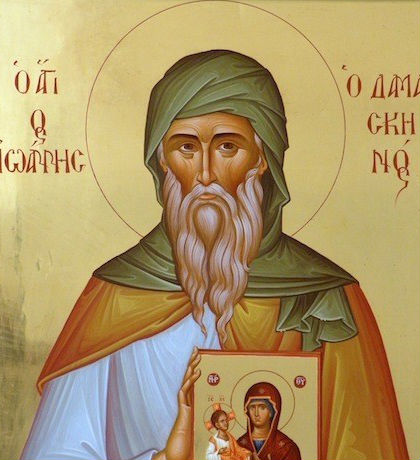
"And I shall add He is also the Father of all His creatures ... the radiance of those who are enlightened: the initiation of the initiated: the deification of the deified: ..." (John of Damascus. "Exposition of the Orthodox Faith 1: 12." Nicene and Post-Nicene Fathers. Ed. Philip Schaff. Vol. 9. New York: C. Scribner's Sons, 1899. 13. Print. Ser. 2.)
"... in the age to come, he is changed and - to complete the mystery - becomes deified by merely inclining himself towards God; becoming deified, in the way of participating in the divine glory ..." (John of Damascus. "Exposition of the Orthodox Faith 2: 12." Nicene and Post-Nicene Fathers. Ed. Philip Schaff. Vol. 9. New York: C. Scribner's Sons, 1899. 31. Print. Ser. 2.)
"... every God-inspired man may be called Christ, but as yet he is not by nature God: ... And thus it is that the holy Virgin is thought of and spoken of as the Mother of God, not only because of the nature of the Word, but also because of the deification of man's nature, ... bestowing manhood on the God and Creator of all, Who deified the nature that He assumed, while the union preserved those things that were united just as they were united, that is to say, not only the divine nature of Christ but also His human nature, not only that which is above us but that which is of us." (John of Damascus. "Exposition of the Orthodox Faith 3: 12." Nicene and Post-Nicene Fathers. Ed. Philip Schaff. Vol. 9. New York: C. Scribner's Sons, 1899. 56-57. Print. Ser. 2.)
Saint Theodoros the Great Ascetic of Edessa (785 to 848 CE)
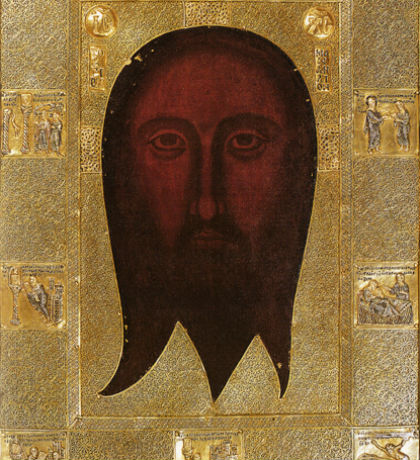
"In the wake of this purification, and the mortification or correction of ugly features, there should follow spiritual ascent and deification. ... [one] must follow the Master towards the supreme state of deification. What are ascent and deification? For the intellect, they are perfect knowledge of created things, and of Him who is above created things, so far as such knowledge is accessible to human nature. For the will, they are total and continuous striving towards primal goodness. And for the incensive power, they are energetic and effective impulsion towards the object of aspiration, persistent, relentless, and unarrested by any practical difficulties, pressing forward impetuously and undeviatingly." (Theodore of Edessa. "Theoretikon." Philokalia. Ed. G.E.H. Palmer. Vol. 2. London: Faber and Faber, 1981. 38. Print.)
Saint Peter of Damascus (around 1100 CE)
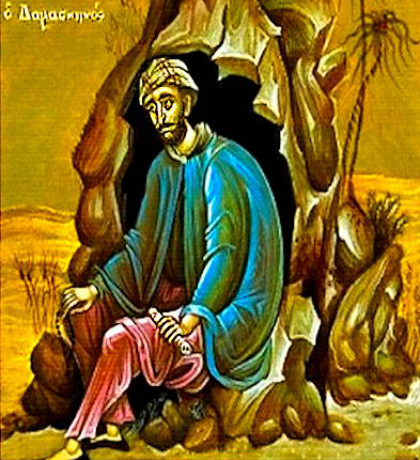
"... by our free choice we abandon our own wishes and thoughts and do what God wishes and thinks. If we succeed in doing this, there is no object, no activity or place in the whole of creation that can prevent us from becoming what God from the beginning has wished us to be: that is to say, according to His image and likeness, gods by adoption through grace, ..." (Peter of Damaskos. "Treasury of Divine Knowledge 1: Introduction." Philokalia. Ed. G.E.H. Palmer. Vol. 3. London: Faber and Faber, 1981. 76. Print.)
"Through the wisdom and indwelling of the Holy Spirit and through adoption to sonship, we are crucified with Christ and buried with Him, and we rise with Him and ascend with Him spiritually by imitating His way of life in this world. To speak simply, we become gods by adoption through grace, receiving the pledge of eternal blessedness, as St Gregory the Theologian says. In this way, with regard to the eight evil thoughts, we become dispassionate, just, good and wise, having God within ourselves - as Christ Himself has told us ..." (Peter of Damaskos. "Treasury of Divine Knowledge 1: Introduction." Philokalia. Ed. G.E.H. Palmer. Vol. 3. London: Faber and Faber, 1981. 79. Print.)
"In the end [the commandments] make man a god, through the grace of Him who has given the commandments to those who choose to keep them." (Peter of Damaskos. "Treasury of Divine Knowledge 1: Seven Forms of Bodily Discipline." Philokalia. Ed. G.E.H. Palmer. Vol. 3. London: Faber and Faber, 1981. 93. Print.)
"All the Beatitudes make man god by grace; ... For if we learn while on earth to imitate Christ and receive the blessedness inherent in each commandment, we shall be granted the highest good and the ultimate goal of our desire." (Peter of Damaskos. "Treasury of Divine Knowledge 1: Seven Commandments." Philokalia. Ed. G.E.H. Palmer. Vol. 3. London: Faber and Faber, 1981. 98. Print.)
"He is amazed to see how the wisdom of God renders what is difficult easy, so that gradually it deifies man. ... he is endowed with every virtue and is perfect, as the Father is perfect. In short, the Holy Bible teaches us that what befits God befits man as well, so that [man] becomes god by divine adoption." (Peter of Damaskos. "Treasury of Divine Knowledge 1: Fourth Stage of Contemplation." Philokalia. Ed. G.E.H. Palmer. Vol. 3. London: Faber and Faber, 1981. 123-124. Print.)
Saint Theognostos (around 1300 CE)
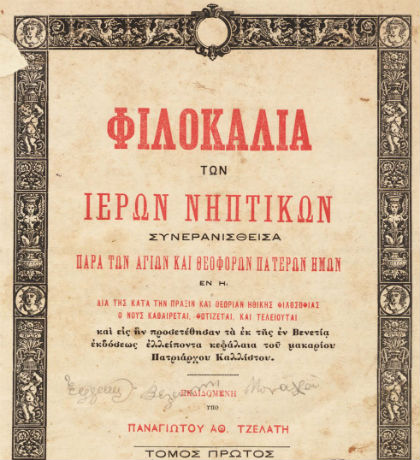
"Through your entreaties constrain the Creator not to let you fail in your purpose. Constantly bring before Him as intercessors all the angelic powers, all the saints, and especially the most pure Mother of God. Do not ask for dispassion, for you are unworthy of such a gift, but ask persistently for salvation and with it you will receive dispassion as well. The one is like silver, the other like pure gold. In particular, let inward meditation on God be your handmaid, and turn your whole attention to the secret mysteries concerning Him: for the principles of these mysteries will deify you, and God delights in them and is won over by them." (Theognostos. "On the Practice of the Virtues, Contemplation and the Priesthood 32." Philokalia. Ed. G.E.H. Palmer. Vol. 2. London: Faber and Faber, 1981. 366. Print.)

